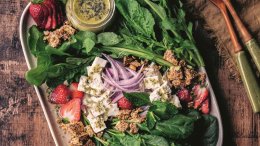The days when the only spot to grab a healthful juice was Orange Julius (Piña Colada Julius anyone?) seem to be a distant memory.
Since then, juicing has outgrown the food court and taken up residence in bright, trendy juice bars across the country, with the promise of squeezing every last bit of goodness out of vegetables, fruits and nuts to help you eat and live better.
There’s a certain appeal to blending a lot of your daily recommended vitamins and nutrients into a single drink and be done with it, potentially allowing you to skip the dreaded lunch salad. And if we’re to believe all the avid fans, hopping on this bandwagon is a great way to detox the body, prevent diseases, lose weight and ultimately extend your lifespan.
Let’s break down the raw facts on whether these pricey cups of green goodness can really affect our overall well being.
![Image for [node:title]](/sites/default/files/styles/article_freeheight/public/field/image/rs118_foodiefeed.com_premium-package_coconut-11-scr.jpg?itok=b0J4EzhR)
Why juice?
If you’re not big into fruits and vegetables, juicing is a great way to get them into your diet. Juicing helps you conveniently and efficiently consume a large quantity in one sitting, allowing highly concentrated vitamins and minerals to be rapidly absorbed. Even if you are a fruit and veggie fanatic, you might not have the time to prep and eat the recommended servings each day.
Many people buy tons of produce with the best of intentions, only to have it spoil before it ever makes it to their taste buds. Juicing is a great way to use up much of your fresh produce before they go bad.
What are the drawbacks?
Juicers extract the juice and leave behind the pulp in whole fruits and vegetables, which has much needed fibre (which is why there are many juicing haters out there) that helps regulate your blood sugar levels after eating a piece of whole fruit.
Juice can be a great addition to your regular diet, but nutrition experts do not recommend using it as a meal replacement.
“Not only is juice missing fibre, protein, fats and certain vitamins and minerals, but depending on what’s in it, most juices across the board tend to be low in thiamine, niacin, vitamin B12, vitamin D and zinc, to name a few,” cautions registered dietitian, Vincci Tsui.
“Because juices are liquid, they’re not as satiating as a solid meal or even a smoothie, so you’d likely be hungry again within an hour or so and looking for something to snack on. More often than not, when we're hungry and don't have anything planned, we tend to choose more convenient, high-calorie food, and in larger amounts.”
And just how many calories are in your juice? That depends on what's in it. If the juice is vegetable-based with minimal fruit, it can be added to your regular diet to increase vitamin consumption. If the juice features more fruit than vegetables and is consumed daily, try to minimize the fruit intake.
“The concern with fruit juices is that it's not really that different from drinking anything else with added sugars--it just adds empty calories. Yes, you do get some vitamins and minerals, but you get more bang for your buck (in terms of the variety of nutrients, satiety and appetite control) when you eat the actual food versus drinking juice. I recommend limiting fruit juice to a maximum of half cup per day.” Says Tsui.
What’s a good way to add fibre to juice recipes?
Blending in greens is always an option. Spinach is a soft green that blends smoothly with the other produce when juiced, and it doesn’t have the chunks you might get with kale. Other fibre-heavy ingredients you can add are psyllium husk, hemp seed, flax seed, pea protein and any sort of nut.
Alternatively, if you’re worried about all that excess fibre extracted from your juicer, try saving it and adding to your cooking (muffins, broth etc.), going the extra mile to fortify your food.
You can also balance your juice by adding protein like almond milk, Greek yogurt, flaxseed, and peanut butter.
![Image for [node:title]](/sites/default/files/styles/article_freeheight/public/field/image/rs66_foodiesfeed.com_premium-package-fruit-51-scr.jpg?itok=BoJIBOq5)
What’s the deal with juice cleanses?
A cleanse consists of at least one day of juice-only meals to obtain all of the nutrients required for a day’s worth of calories. People opt to cleanse for many different reasons: detox, breaking down built up toxins, kick starting weight loss, and getting the body used to eating less food and healthier ingredients.
However, there is no evidence that either detoxes or cleanses are beneficial to the body.
“It makes zero sense that all the different cleanses on the market, with different lengths and different dietary restrictions, can possibly have the same effect,” explains Tsui. “Although going on a liquid diet might help you lose weight in the short term, it’s likely the weight will pile back on once you start consuming more calories again, as in real food.”
You may not get enough fibre or protein to make you full, leading to naughty cravings that could lead to eating… an entire cake. Talk about backfiring.
“In some cases, the weight loss you see with a juice cleanse is water weight, due to the significant decrease in sodium and calorie intake. But remember that whatever you do to lose the weight, you have to keep doing it to keep it off. That's why temporary diets, cleanses and detoxes never work, because they are not meant to be sustainable.”
And really, who wants to consume every meal out of a straw for days anyway?
Bottom line
Although juicing in moderation can easily help you ingest large quantities of essential nutrients, it’s not a cure-all, and it just can’t replace eating a healthful diet.













